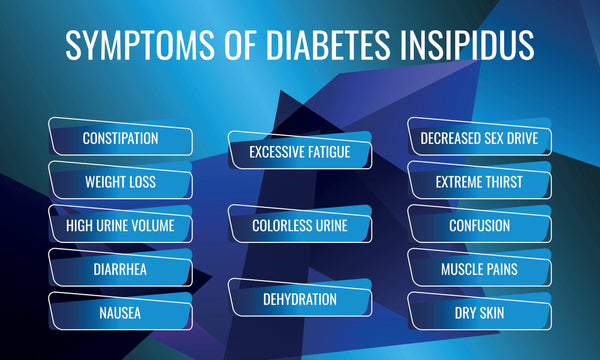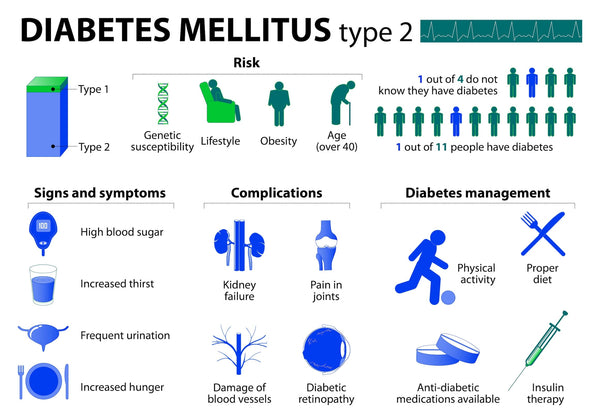Polydipsia - Symptoms, Causes and Treatment

Polydipsia, a term for excessive thirst, is a complex condition where an individual experiences a persistent, overwhelming urge to drink fluids. This condition extends beyond the occasional thirst everyone experiences, persisting for long durations—days, weeks, or even months—without relief, even after consuming large amounts of liquid. Such an insatiable thirst is not just discomfort but could signal underlying health issues requiring medical help.
Adequate hydration is pivotal for optimal functioning, as water is crucial in various physiological processes. However, polydipsia pushes beyond normal hydration needs and is often accompanied by symptoms such as a perpetually dry mouth (xerostomia) and an increased frequency of urination (polyuria). These symptoms are the body's attempt to manage and balance its fluid levels, but when excessive thirst is involved, it indicates that this balance is disrupted.
Polydipsia is frequently associated with conditions that lead to increased urine output. This includes not just lifestyle factors like high-intensity exercise, consumption of salty foods, or diuretics but also more concerning medical conditions like diabetes mellitus. In diabetes, the body struggles to effectively process and utilize glucose (blood sugar), leading to high blood sugar levels. These high levels contribute to the body's increased fluid loss and the resultant feeling of thirst as it attempts to flush out excess glucose.
Primary Polydipsia
Primary polydipsia (PP) manifests through excess consumption of fluids, leading to polyuria (increased urine output) with diluted urine and, ultimately, hyponatremia (a condition where there is an abnormally low concentration of sodium in the blood). The excessive intake of water dilutes the body's sodium levels, leading to a range of symptoms from mild to severe, including confusion, seizures, and, in extreme cases, water intoxication.
Primary polydipsia is categorized into psychogenic polydipsia and dipsogenic polydipsia based on the underlying causes driving excessive thirst and fluid intake.
- Psychogenic polydipsia: Psychogenic polydipsia is primarily associated with mental health disorders. Individuals with psychiatric conditions, such as schizophrenia, bipolar disorder, or anxiety disorders, are more prone to this type of polydipsia. The excessive drinking behavior here is not driven by the body's need for fluids but by psychological impulses. Patients may drink large volumes of water as a compulsive behavior or due to delusional beliefs about needing to consume excessive fluids.
- Dipsogenic polydipsia: Dipsogenic polydipsia arises from a disruption in the body's natural thirst regulation mechanisms, often linked to damage or dysfunction within the hypothalamus—the area of the brain responsible for signaling thirst. This dysfunction leads to a distorted perception of thirst, compelling individuals to drink more than necessary for their body's hydration needs. Conditions such as certain neurological diseases, head injuries, or genetic disorders can contribute to the development of dipsogenic polydipsia. Unlike psychogenic polydipsia, where psychological factors drive excessive thirst and drinking, the excessive thirst and drinking in dipsogenic polydipsia are direct responses to an incorrect physiological signal rather than a psychiatric condition. Additionally, dipsogenic polydipsia (Habitual polydipsia), also known as compulsory water drinking, is observed in individuals who consciously consume large quantities of water, aiming to maintain what they perceive as a healthy lifestyle. This behavior can worsen the condition, especially in those with compromised hypothalamic function. In these cases, the drive to drink water excessively stems from an altered physiological drive—due to hypothalamic damage or dysfunction—and from a misinformed belief in the health benefits of excessive water consumption.
It's essential to monitor your water intake and consult a healthcare provider if you experience persistent excessive thirst, as it could be a sign of these or other health conditions.

Causes for Polydipsia
Feeling thirsty is your body's way of telling you it needs more water, which is essential for good health. Sometimes, you feel thirsty just because you haven't had enough water, especially after eating salty or spicy foods, consuming caffeine or alcohol, sweating a lot during exercise, experiencing illness with symptoms like fever or vomiting, or during pregnancy. Certain medications can also make you feel thirsty.
However, if you're always thirsty, it might indicate a health issue, such as diabetes mellitus, where high blood sugar levels cause excessive thirst as one of the primary symptoms.
Beyond diabetes mellitus, constant thirst and frequent urination without the presence of diabetes mellitus could suggest several other conditions, including:
- Diabetes insipidus: Unlike diabetes mellitus, diabetes insipidus involves the kidneys and affects water regulation in the body, producing large amounts of urine.
- Fluid shifts: Certain conditions like burns, sepsis, and organ failures (kidney, liver, or heart) can cause fluids to move from the bloodstream into tissues.
- Dehydration: Not drinking enough water over time can lead to dehydration, where your body lacks the fluids it needs to function correctly.
- Low blood potassium (hypokalemia): This is a condition where there's not enough potassium in your blood, affecting your body's balance of minerals and fluids.
- Cystic disease: This is a condition where cysts form near or on the kidneys, affecting kidney function and possibly leading to increased thirst.
Causes of Excessive Thirst at Night
Feeling excessively thirsty at night could be because you haven't had enough water during the day. Our bodies need water to produce saliva; you might have a dry mouth without enough hydration. There are also other reasons you might find yourself thirsty at night, including:
- The medications you take.
- Your diet and drink choices before bed.
- Consuming alcohol in the evening.
- The temperature of your bedroom.
- Breathing through your mouth while you sleep.
- Some underlying health conditions.
Staying hydrated throughout the day, adjusting your evening habits, and maintaining a comfortable sleeping environment can help manage nighttime thirst. If you continue to experience extreme thirst despite making these adjustments, consult a healthcare provider to rule out any underlying issues.
Polydipsia Symptoms
The most noticeable sign of polydipsia is an extreme and persistent thirst, even after drinking plenty of water.
Additional signs include:
- Passing a large volume of urine daily (over 5 liters).
- Constant dry mouth.
If polydipsia is linked to diabetes, you might also experience:
- Increased hunger (Polyphagia).
- Blurred vision.
- Fatigue.
- Unexplained weight loss.
- Frequent infections or sores.
- Slow healing.
Excessive water intake can lead to water intoxication or hyponatremia, where the body's sodium levels drop too low, causing:
- Headaches.
- Dizziness or confusion.
- Muscle cramps or spasms.
- Seizures without a known cause.
It's important to balance water intake and be aware of symptoms that might indicate underlying health issues. Consulting a healthcare professional is advisable if you're experiencing these symptoms regularly.
Polydipsia Treatment
Sometimes, what seems like ongoing extreme thirst might be a temporary phase, not polydipsia. To get a clearer picture, take note of your thirst:
- Track how often and how long you feel thirsty.
- Observe if there are other symptoms accompanying your thirst.
- Consider if your thirst spikes after specific activities.
- Assess if drinking 64 ounces (about 1.9 liters) of water daily eases your thirst.
If this intense thirst persists beyond a few days, despite varying activity levels or water intake, consult a doctor.
For polydipsia diagnosis and treatment, your doctor might:
- Conduct blood tests.
- Urine test.
- Suggest a fluid deprivation test to monitor how your body responds to reduced fluid intake.
Should diabetes mellitus be identified as the cause, lifestyle modifications related to diet and exercise may be advised, alongside medications tailored to your diabetes type—insulin for type 1 and possibly metformin for type 2.
For diabetes insipidus, treatment might include desmopressin, a synthetic hormone that compensates for the body's inadequate vasopressin production, available as a nasal spray, pill, or injection.
If polydipsia is caused by a mental health condition, seeking help from a counsellor or therapist might be recommended to address the underlying issue, which could involve medication management, strategies or cognitive behavioral therapy (CBT) to curb the compulsion for excessive water intake.

A Word from Viasox
Viasox is a company committed to enhancing the lives of individuals with diabetes through education and specialized products. Recognizing the importance of foot health in managing diabetes, Viasox offers a range of diabetic socks and compression socks designed to prevent complications that can arise from this chronic condition. Our products are tailored to meet the unique needs of people with diabetes, providing comfort, support, and protection to help maintain optimal foot health.
Additionally, Viasox is proud to be recognized by FeedSpot, a testament to our commitment to educating and supporting the diabetes community. Our mission to inform people about diabetes and prevent foot complications is to make a difference, and we're grateful to Feedspot.com for valuing our work and including us in their list of 100 Best Diabetes Blogs. This acknowledgment motivates us to continue helping individuals manage diabetes with confidence and care.




















